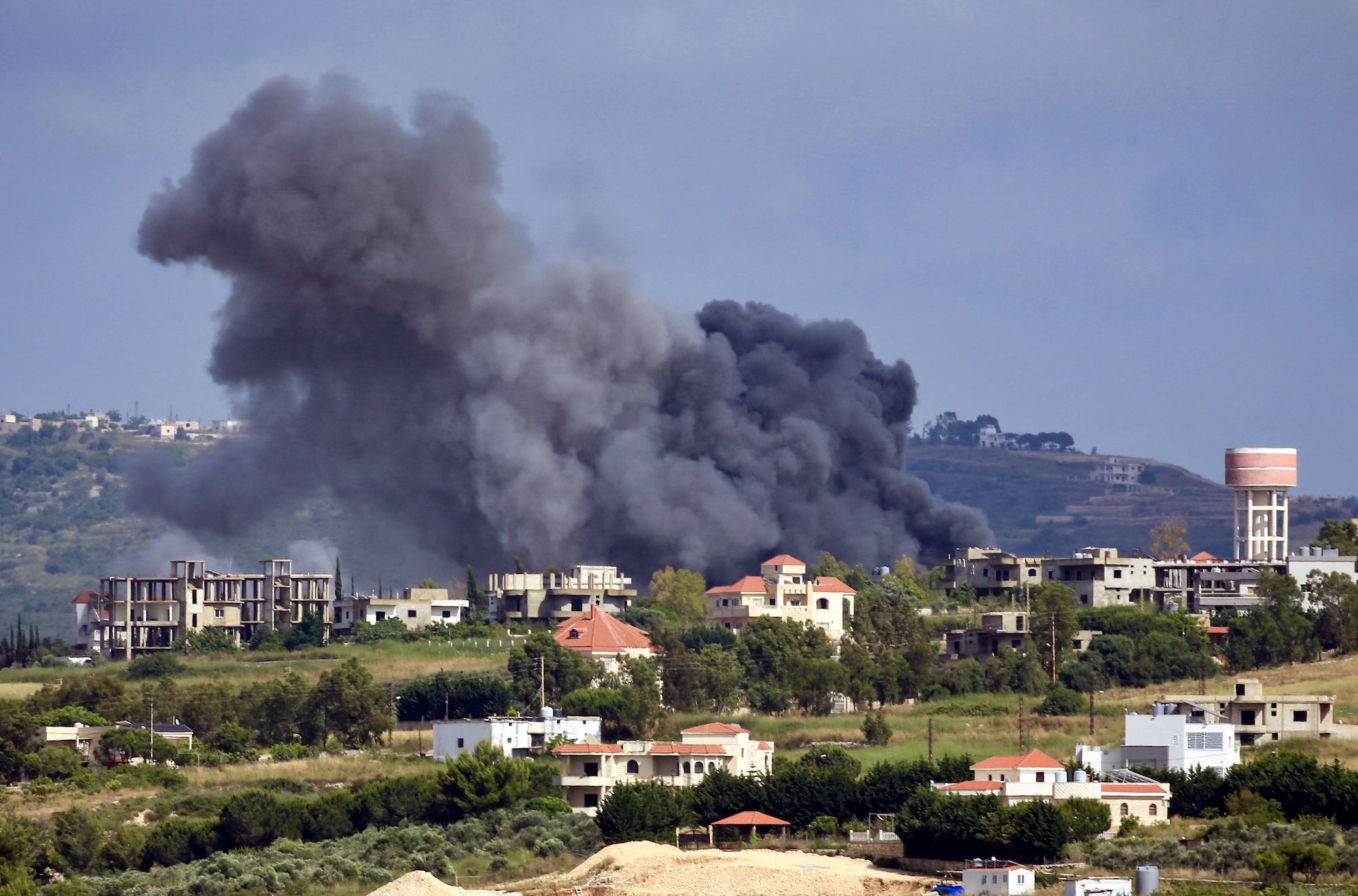- Israel carried out its deadliest airstrikes in Lebanon since 2006, killing at least 558 people and injuring over 1,800, leading to mass displacement. (TheGuardian.com)
- Hezbollah launched over 100 projectiles into Israel in retaliation for the strikes, marking the deepest hits into Israeli territory in years. (CNN.com)
- Israeli strikes have escalated tensions in Lebanon, with fears of a broader conflict as Israel continues to target Hezbollah military infrastructure. (Reuters.com)
- Israeli officials confirm targeted airstrikes killed senior Hezbollah commanders, including Ibrahim Aqil and Ibrahim Muhammad Qubaisi, involved in rocket attacks on Israel. (FoxNews.com)
- Global leaders, including the UN, are calling for an urgent de-escalation as the violence between Israel and Hezbollah continues. (AlJazeera.com)
From the Israeli perspective, the airstrikes were necessary preemptive actions to defend against Hezbollah's growing military presence in Lebanon. Israel views Hezbollah as a direct threat, given its rocket and missile capabilities, and argues that these operations are essential to ensure the safety of its civilians. By targeting Hezbollah commanders and infrastructure, Israel seeks to weaken the group's ability to launch further attacks on Israeli territory, especially in light of the ongoing Gaza conflict.
From a Lebanese perspective, particularly among civilians affected by the strikes, the Israeli bombings are seen as disproportionate aggression that has caused significant civilian casualties and mass displacement. Many in Lebanon view the airstrikes as unjustified attacks on their sovereignty, further destabilizing an already fragile region. Civilians, including families like Hassan’s, are fleeing their homes under constant threat, with many believing the strikes are an overreach aimed at Lebanon’s broader infrastructure rather than solely targeting Hezbollah.
Hezbollah and its supporters frame their retaliatory rocket launches as acts of resistance against Israeli occupation and aggression. From this viewpoint, Hezbollah’s military actions are seen as defending Lebanon’s territorial integrity and supporting Palestinians in Gaza. Hezbollah positions itself as part of a broader struggle against Israeli actions in the region, arguing that their response is justified in light of the repeated airstrikes and civilian casualties in Lebanon.
Details
Security
Bias
Deltas
Recent events in the Middle East have seen an intensification of the conflict between Israel and Hezbollah, resulting in devastating airstrikes, civilian displacement, and global calls for de-escalation. This surge in violence follows months of growing tension as the war between Israel and Hamas spills over into neighboring Lebanon. On Monday, Israeli airstrikes killed more than 558 people and injured over 1,800 in southern Lebanon, marking the deadliest day of violence in the region since 2006. Civilians have fled their homes en masse, with thousands of families packing their belongings into cars and heading north to escape the bombardment. According to The Guardian, Israel’s strikes targeted areas believed to harbor Hezbollah military infrastructure, but the result was widespread devastation in towns like Deir al-Zahrani, where civilians were caught in the crossfire.
Hezbollah, a Lebanese militant group backed by Iran, retaliated by launching over 100 projectiles deep into Israeli territory. This marked the group’s most significant attack in years, as missiles struck northern Israeli towns like Haifa, prompting schools to close and residents to flee the area. According to CNN, Hezbollah has positioned itself as a defender of Lebanon against Israeli aggression, framing its actions as retaliation for Israel's repeated strikes on Lebanese soil. In response, Israel claims that its airstrikes were preemptive, aimed at preventing a planned Hezbollah attack. The Israeli Defense Forces (IDF) confirmed that among those killed in their strikes were senior Hezbollah commanders, including Ibrahim Aqil and Ibrahim Muhammad Qubaisi, both key figures in Hezbollah’s missile operations (Fox News).
The humanitarian crisis resulting from these clashes is evident, with civilians bearing the brunt of the violence. Displacement centers have been set up in and around Beirut, where schools have been converted into makeshift shelters to house the thousands fleeing from southern Lebanon. As The Guardian reports, local and international humanitarian organizations are scrambling to provide essentials like food, water, and hygiene kits to those displaced. However, the overwhelming number of people arriving in Beirut has stretched these resources thin. The escalating violence has also disrupted access to medical care, with hospitals in Lebanon struggling to treat the wounded as airstrikes continue to target civilian areas, according to Al Jazeera.
The international community, including the United Nations, has expressed alarm at the scale of the violence and its potential to spark a broader regional conflict. Multiple world leaders have urged both Israel and Hezbollah to exercise restraint, warning that continued attacks could destabilize the region further. The Israeli government, however, maintains that its actions are necessary to safeguard its northern border and prevent Hezbollah from gaining the upper hand militarily. Lebanese officials, on the other hand, argue that Israel’s strikes are causing unnecessary civilian casualties and are violating Lebanon’s sovereignty. According to Reuters, Hezbollah has vowed to continue its retaliation as long as Israeli airstrikes persist, despite the heavy losses the group has sustained in recent days.
As the conflict escalates, both sides appear to be preparing for a protracted struggle. Israeli Prime Minister Benjamin Netanyahu has warned that the strikes will continue until the safety of Israeli citizens is assured. On the Lebanese side, Hezbollah's leadership has made it clear that they will not back down, framing their actions as part of a broader resistance against Israeli occupation in the region. Both sides face immense pressure from their respective populations, with Israeli citizens displaced by rocket fire and Lebanese civilians fleeing the destruction of their homes. As The New York Times highlights, the possibility of an all-out war looms large, with the potential to draw in other regional players such as Iran, Syria, and even the United States, further complicating an already volatile situation.

The article emphasizes the human suffering and devastation in Lebanon, for example by highlighting quotes such as 'Israel carried out a devastating aerial barrage,' and detailing the impact on civilians like Hassan and his family. There is little focus on the Israeli perspective or justification for the strikes.
Read full article

The article highlights the human cost, stating 'Israel’s bombardment of Lebanon kills 569,' and focuses on the civilian toll, often framing Israel's actions as disproportionate. It also includes global calls for restraint, painting Israel as the aggressor.
Read full article

The article emphasizes Israel’s military actions and suggests that Israel’s approach may lead to a broader conflict. For example, it quotes Chinese officials warning of 'escalating violence that could drag the region into a wider conflict.'
Read full article
Negative
Sentiment

The article discusses Israeli airstrikes and Hezbollah's rocket attacks in a factual manner, avoiding heavy opinion. For example, it states, 'Israel carried out its deadliest airstrikes in Lebanon,' and 'Hezbollah retaliated by launching over 100 projectiles.' The coverage is balanced without leaning too heavily toward either side.
Read full article

The article describes the ongoing conflict without heavy bias, stating both the actions of Hamas and Israel, such as 'Hamas militants launched an unprecedented attack,' and 'Israel responded with a military operation.' The language remains largely neutral, aiming to inform rather than to persuade.
Read full article

The article covers the events without displaying a clear bias, focusing on statements such as 'Hezbollah launched more than 100 missiles,' and 'Israel launched nearly 300 strikes.' The tone is informative, providing both sides of the conflict without apparent favoritism.
Read full article
The article discusses both Israel's and Hezbollah's actions without strong bias but frames Israel's military efforts as a necessity for securing its northern regions. It avoids painting either side as purely right or wrong.
Read full article
Neutral
Sentiment

The article emphasizes Israeli military achievements, stating 'Israel Defense Forces confirmed it had killed a top Hezbollah commander,' while downplaying the impact on civilians or Hezbollah's retaliation. The tone is more supportive of Israel's actions.
Read full article
The article highlights Hezbollah's resistance and strength, stating that 'Hezbollah still has large weapons reserves,' while framing Israel’s actions as provocations. Hezbollah is portrayed as the more restrained party, only responding to Israeli aggression.
Read full article
Positive
Sentiment


